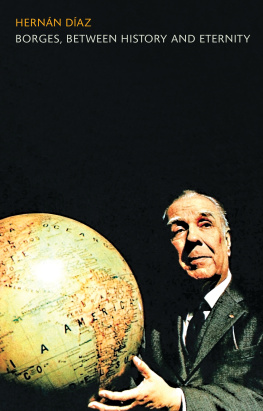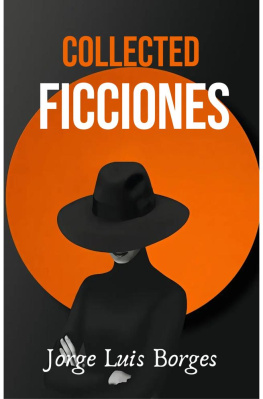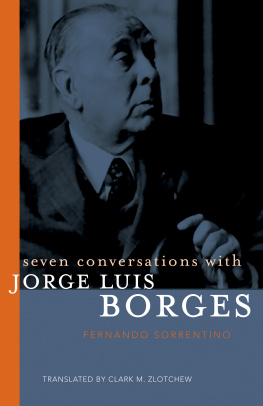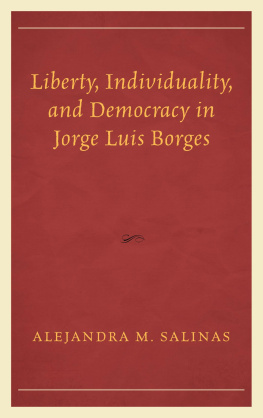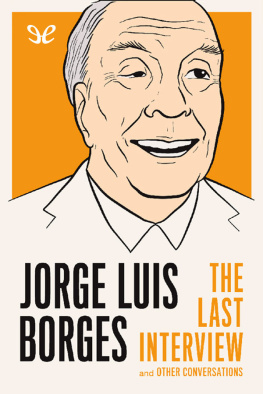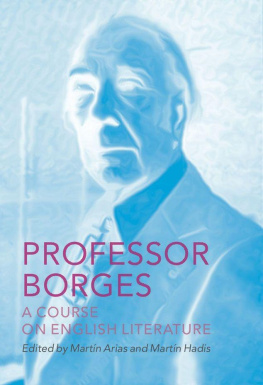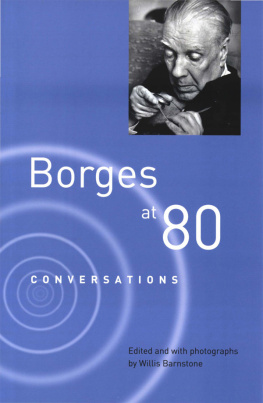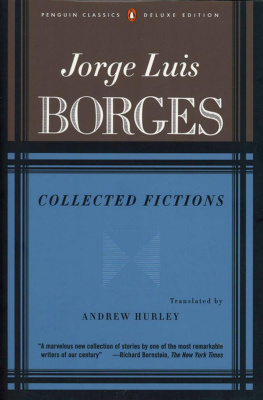Borges Jorge Luis; Borges Jorge Luis - Borges, between history and eternity
Here you can read online Borges Jorge Luis; Borges Jorge Luis - Borges, between history and eternity full text of the book (entire story) in english for free. Download pdf and epub, get meaning, cover and reviews about this ebook. City: London u.a, year: 2012, publisher: Bloomsbury Academic;Continuum, genre: Art. Description of the work, (preface) as well as reviews are available. Best literature library LitArk.com created for fans of good reading and offers a wide selection of genres:
Romance novel
Science fiction
Adventure
Detective
Science
History
Home and family
Prose
Art
Politics
Computer
Non-fiction
Religion
Business
Children
Humor
Choose a favorite category and find really read worthwhile books. Enjoy immersion in the world of imagination, feel the emotions of the characters or learn something new for yourself, make an fascinating discovery.
- Book:Borges, between history and eternity
- Author:
- Publisher:Bloomsbury Academic;Continuum
- Genre:
- Year:2012
- City:London u.a
- Rating:4 / 5
- Favourites:Add to favourites
- Your mark:
- 80
- 1
- 2
- 3
- 4
- 5
Borges, between history and eternity: summary, description and annotation
We offer to read an annotation, description, summary or preface (depends on what the author of the book "Borges, between history and eternity" wrote himself). If you haven't found the necessary information about the book — write in the comments, we will try to find it.
Borges, between history and eternity — read online for free the complete book (whole text) full work
Below is the text of the book, divided by pages. System saving the place of the last page read, allows you to conveniently read the book "Borges, between history and eternity" online for free, without having to search again every time where you left off. Put a bookmark, and you can go to the page where you finished reading at any time.
Font size:
Interval:
Bookmark:
Borges, between History and Eternity
Borges, between History and Eternity
Hernn Daz

Continuum International Publishing Group
A Bloomsbury company
50 Bedford Square | 80 Maiden Lane |
London | New York |
WC1B 3DP | NY 10038 |
www.continuumbooks.com
Hernn Daz, 2012
All rights reserved. No part of this book may be reproduced, stored in a retrieval system, or transmitted, in any form or by any means, electronic, mechanical, photocopying, recording, or otherwise, without the permission of the publishers.
Selections from El jardn de los senderos que se bifurcan , El Aleph , Discusin , El libro de arena , Historia universal de la infamia (Copyright 1995 by Mara Kodama), and El otro, el mismo , El oro de los tigres , Elogio de la sombra , Fervor de Buenos Aires (Copyright 1996 by Mara Kodama), used by permission of The Wylie Agency LLC.
The Garden of Forking Paths, The Aleph, The Book of Sand, from Collected Fictions by Jorge Luis Borges, translated by Andrew Hurley, copyright 1998 by Mara Kodama; translation copyright 1998 by Penguin Putnam Inc. Used by permission of Viking Penguin, a division of Penguin Group (USA) Inc. The Perpetual Race of Achilles and the Tortoise, translated by Suzanne Jill Levine, The Argentine Writer and Tradition, translated by Esther Allen, from Selected Non-Fictions by Jorge: Luis Borges, edited by Eliot Weinberger, copyright 1999 by Mara Kodama; translation copyright 1999 by Penguin Putnam Inc. Used by permission of Viking Penguin, a division of Penguin Group (USA) Inc. Ode Written in 1966, translated by W.S. Merwin, copyright 1999 by Mara Kodama; translation 1999 by W.S. Merwin, In Praise of Darkness, translated by Hoyt Rogers, copyright 1999 by Mara Kodama; translation copyright 1999 by Hoyt Rogers, Prologue: Fervor de Buenos Aires, translated by Alexander Coleman, copyright 1999 by Mara Kodama; translation 1999 by Alexander Coleman, from Selected Poems by Jorge Luis Borges, edited by Alexander Coleman. Used by permission of Viking Penguin, a division of Penguin Group (USA) Inc.
Whilst every effort has been made to locate copyright holders the publishers would be grateful to hear from any person(s) not here acknowledged.
Library of Congress Cataloging-in-Publication Data
A catalog record for this book is available at the Library of Congress.
ePub ISBN: 978-1-4411-5292-3
Typeset by Deanta Global Publishing Services, Chennai, India
Para mis padres, Ana y Pablo
CONTENTS
Two circumstances mitigate the somewhat grandiose title of this book. The first is that it is not fully mine, but a paraphrase of one of Borgess own titles, that of his 1936 collection of essays, History of Eternity . The paradox condensed in those three words highlights the fundamental distinction that inspires my own book: the opposite of eternity is not ephemerality or brevityafter all, as Borges has shown repeatedly through Zenos parable, even the shortest segment of time or space can be subjected to infinite subdivisions. The opposite of eternity is history: if eternity is an abstraction, history is material; if eternity is universal, history is particular; if eternity is a smooth, unmarked continuum, history is nothing but notches. This leads to the second justification of my title: it identifies the extremes between which Borges seems to be trapped. On the one hand, the Latin American writer with his political contradictions; his profoundly Argentine language, topics, and characters (yet skirting, miraculously, becoming a folkloric curiosity); his old criollo lineage, his gaucho fetishes, and his knife-fighting obsession; his profoundly revolutionary views of literary history; and his subversive conception of the canon. On the other hand, the cosmic mystic, the labyrinth-maker, with his incorporeal enigmas; his passion for obscure metaphysical conundrums; his esoteric and apocryphal references; his universal approach to literature; his theological thought experiments; and his nesting realities that ultimately show there is no reality. In brief, the historical vision of Borges is context-saturated, while the eternal view is context-deprived.
This tension between history and eternity is not always clear-cut or irreconcilable, and in Borgess own texts these lines often intertwine. However, among Borges scholars there tends to be an opposition between the institutional and transcendental approaches. The first position could be best illustrated by Borgess own The Argentine Writer and Tradition. In this 1951 lecture, Borges reflects on the definition of national literature, analyzes how it relates to history, and finally overturns basic hierarchies by arguing that the periphery is a far more productive territory for a writer than the center. Although the following passage has been quoted countless times, it is worth reproducing it here once again: What is Argentine tradition? I believe that this question poses no problem and can easily be answered. I believe that our tradition is the whole Western culture, and I also believe that we have a right to this tradition, a greater right than that which the inhabitants of one Western nation or another may have (SF 42526) [Cul es la tradicin argentina? Creo que podemos contestar fcilmente y que no hay problema en esta pregunta. Creo que nuestra tradicin es toda la cultura occidental, y creo tambin que tenemos derecho a esta tradicin, mayor que el que pueden tener los habitantes de una u otra nacin occidental (OC 272)]. Borges then quotes Veblen, who says that Jews are prominent in Western culture because they act within that culture and at the same time do not feel bound to it by any special devotion (SF 426) [dice que [los judos] sobresalen en la cultura occidental, porque actan dentro de esa cultura y al mismo tiempo no se sienten atados a ella por una devocin especial (OC 272)]. This sets the stage for Borgess main point: I believe that Argentines, and South Americans in general, are in an analogous situation; we can take on all the European subjects, take them on without superstition and with an irreverence that can have, and already has had, fortunate consequences (SF 426) [Creo que los argentinos, los sudamericanos en general, estamos en una situacin anloga; podemos manejar todos los temas europeos, manejarlos sin supersticiones, con una irreverencia que puede tener, y ya tiene, consecuencias afortunadas (OC 273)]. Expanding the premises and consequences of this hypothesis occupies a great number of Borges scholars who investigate his ideas on tradition and innovation, his provocatively minor literature, and his appropriation of the margins. These contextual readings are concerned with Borgess interventions in historyin both a political and literary sense. How (and why) does Borges connect, say, Evaristo Carriego and Heinrich Heine or Ralph Waldo Emerson and Justo Jos de Urquiza? How does his fascination with Argentine popular myths coexist with his rabid anti-Peronism, or his obsession with an archetypal Argentina with his cosmopolitan approach to literature? How did his avant-garde writings break with Latin American modernismo , and how are these early experiments related to the classical style of his later period? How does he splice high and popular literature? How did he manage to turn a physical space (the orillas , the outskirts of Buenos Aires, a margin that is neither urban nor rural) into a literary territory that revised the contrast between the modern lettered city and the romanticized, rustic pampas ? How did he turn these orillas into a synecdoche of Argentina as a whole? These are a few of the important questions that have been asked from the historical perspective over the years.
Next pageFont size:
Interval:
Bookmark:
Similar books «Borges, between history and eternity»
Look at similar books to Borges, between history and eternity. We have selected literature similar in name and meaning in the hope of providing readers with more options to find new, interesting, not yet read works.
Discussion, reviews of the book Borges, between history and eternity and just readers' own opinions. Leave your comments, write what you think about the work, its meaning or the main characters. Specify what exactly you liked and what you didn't like, and why you think so.

